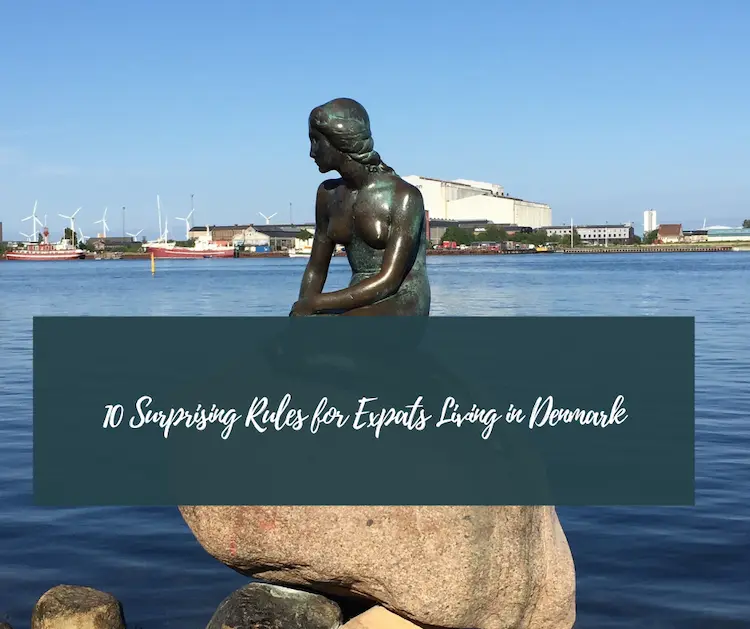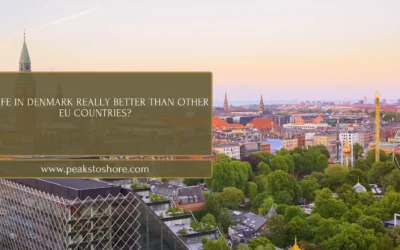If you think moving to Denmark is all cozy hygge vibes, stylish bikes, and cinnamon rolls, think again. While life in Denmark can feel like stepping into a minimalist dream—clean cities, orderly systems, and social equality—it also comes with a surprising set of unspoken rules. And I’m not just talking about learning to pronounce “rødgrød med fløde.” From social norms that frown on spontaneity to fines for improper recycling, this country plays by a different rulebook. So, before you settle in and make yourself at home, let’s talk about the 10 surprising rules you’ll face living in Denmark—because trust me, no one tells you these upfront.
1. Don’t Talk to Strangers on the Bus
Small talk is basically illegal (not really, but close). In Denmark, silence on public transport is golden. Striking up a chat with a stranger on the bus or train will earn you anything from a raised eyebrow to a full-on glare. It’s not personal—Danes just value privacy and personal space, especially in shared public settings.
Why It Exists: Danish culture emphasizes boundaries and autonomy. People don’t like to intrude—or be intruded upon.
What to Do Instead: Bring headphones, a book, or just embrace the silence. If you really need to talk, do it outside the bus or train.
Extra Insight: Public transport is seen more as a “quiet zone” rather than a social space. This is also tied to the Danish preference for peace in all aspects of life. The trains even have quiet zones in some sections, where talking is explicitly discouraged.
2. Recycling Isn’t a Suggestion—It’s Practically Religion
Denmark is a global leader in sustainability, and recycling here is no joke. Your trash needs to be sorted perfectly—plastic, paper, bio-waste, metal, electronics—you name it. Fail to follow the rules, and you could get a warning from your kommune (municipality).
Fun Fact: Many Danes even rinse out containers before tossing them in the bin to make them easier to process.
Pro Tip: Study your building’s sorting guide. Each municipality may have slightly different rules. And no, you can’t just guess.
More to Know: In some apartment buildings, there are even dedicated waste rooms with multiple colored bins. Composting is becoming more common in cities too. You’ll find that Danish children learn proper recycling techniques in school, and the public shaming for mis-sorting trash can be very real.
3. Quiet Hours Are Sacred
From 10 PM to 7 AM, Denmark expects peace and quiet. Throwing a party? You’d better inform your neighbors in advance. Mowing the lawn on a Sunday morning? Big no-no.
Enforcement: Neighbors will complain—and your landlord might get involved.
Comparison: Unlike southern Europe’s more relaxed vibe, Danes love order and serenity. Especially in shared housing.
Extra Layer: Many buildings even have posted signs in the hallways reminding residents of quiet hours. The Danish concept of “hensyn” (consideration) plays a huge role in daily life. It’s all about mutual respect.
Tip: Even during the day, loud vacuuming, music, or moving furniture for hours might raise eyebrows. Consider investing in rugs or felt pads for furniture.
4. You Can’t Bring Food into Denmark Easily
Bringing food across the border isn’t as chill as you might think. Denmark has strict import rules, especially for meat, dairy, and fresh produce. That suitcase full of homemade sausages or fresh cheese from your last trip? Likely not allowed.
Why It Exists: The rules are designed to prevent animal diseases and protect the local agriculture sector.
Tip: Always check the official customs guidelines before packing any food.
Added Insight: Even processed snacks or spices might be flagged, depending on their country of origin. If you’re thinking of starting a small food import business or even sending a food package, you’ll need to navigate some dense bureaucracy. It’s safer to explore Denmark’s own specialty shops and international supermarkets.
5. Public Drinking Is Allowed—But Controlled
Unlike many countries, it’s legal to drink alcohol in public spaces in Denmark. You’ll see people sipping beers in parks, on benches, even at bus stops. But don’t get carried away.
What’s Not Allowed: Rowdy or loud behavior, especially in residential areas, will draw police attention fast.
Local Norm: Responsible public drinking is culturally accepted. Sloppy drunkenness? Not so much.
Bonus Fact: Events like Distortion in Copenhagen showcase how public drinking can be done responsibly—though these events also come with increased police presence. Glass bottles are often discouraged during festivals.
6. Sundays Are a Semi-Lockdown
Many shops, including grocery stores, either close early or don’t open at all on Sundays. It’s quiet. Almost eerily so.
Cultural Insight: Sundays are for family, rest, and yes—more hygge.
Plan Ahead: Do your shopping before Sunday. Even large cities like Copenhagen slow down drastically.
Extra Info: Some pharmacies and bakeries may be open for a few hours, but don’t count on it. Sunday laws have roots in religious traditions and labor rights, aiming to ensure everyone gets at least one day of rest.
7. Work Without a Tax Card? Pay 55% in Taxes
If you start working in Denmark without registering for a tax card (“skattekort”), you’ll be hit with an automatic 55% tax rate. It’s legal, but brutal.
How It Works: Until you register with SKAT (the Danish tax authority), your employer must deduct the highest rate.
Action Step: Apply for your tax card as soon as you get a job contract. It’s free, and you’ll thank yourself later.
Pro Tip: You’ll also need a CPR number before applying for a tax card. And without a NemID/MitID and bank account, managing your taxes becomes even trickier. This is one of the most critical steps for expats to get right early on.
8. The Janteloven (Law of Jante) Rules Everything
You won’t find it in any law book, but the Janteloven is a deeply ingrained social rule in Denmark. It essentially means: “Don’t think you’re better than anyone else.”
What It Means: Bragging, self-promotion, or even too much enthusiasm can be seen as arrogance.
Tip: Practice humility. Group achievements are valued more than individual wins.
Extra Insight: This mindset permeates work culture too—team collaboration is prioritized over individual performance, and humility is considered a virtue. It can be a big cultural adjustment if you’re coming from a more individualistic country.
9. There Are More Bike Laws Than You’d Expect
Yes, Denmark is the land of bikes. But no, you can’t just hop on and go. You’ll need a light (front and back), reflectors, hand signals, and don’t even think about biking drunk.
Fun Fact: You can get fined for not signaling with your hands or for biking through a red light.
Quick Checklist:
- Bike lights after sunset
- Working bell
- Hand signals for turns
- Ride on the bike lanes
Deeper Look: There are even rules for how to park your bike—if it blocks a sidewalk or emergency exit, it can be removed by authorities. Biking etiquette is taught in schools, and many Danes will call you out (politely or not) if you break the code.
10. You Can’t Just “Drop By”—You Must Plan Ahead
Spontaneous visits aren’t part of Danish culture. Danes schedule everything—from coffee meetups to birthday parties—weeks in advance.
Why It Matters: Showing up unannounced can be seen as rude or even invasive.
Cultural Note: Even kids often make “playdates” through their parents’ calendars.
More Detail: The high value placed on personal time and planning is a reflection of Denmark’s structured lifestyle. People prioritize work-life balance, and part of that is knowing exactly when and how their free time will be spent.
Tip: Use Doodle polls or text a few days in advance to propose hangouts. You’ll be surprised how organized even socializing is.
Final Thoughts: Embrace the Weird and Wonderful
Yes, some of these rules may feel quirky or overly rigid at first. But over time, you’ll start to appreciate the predictability and calm they bring to daily life. From quiet Sunday strolls to effortless recycling routines, there’s a comforting rhythm to living in Denmark once you understand the playbook.
Planning a move to Denmark or just landed? Make sure you also check out Moving to Denmark: What They Don’t Tell You for a deeper dive into everyday realities, or if you’re still weighing your options, take a look at Portugal for Expats: Paradise or Overhyped? for a different perspective.
Got questions, tips, or rule shock stories of your own? Drop a comment below or share this with a friend who’s thinking of moving to Denmark. And don’t forget to follow @peaks2shore on Instagram and Threads for more honest takes on expat life in Europe.






0 Comments